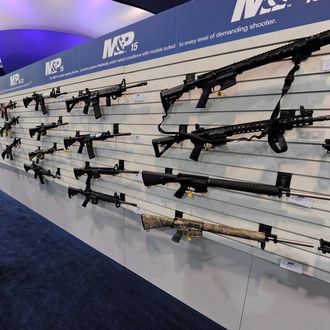
On Wednesday, a holiday party in San Bernardino hosted the latest edition of America’s recurring nightmare. In the wake of another firearm-fueled tragedy, liberals once again begged conservatives to recognize that the United States suffers a level of gun violence without parallel in the developed world — and that this fact is not unrelated to our exceptionally unregulated gun market.
This time, Blue America came armed with a powerful new angle of attack: Since the atrocities in Paris, many Senate Republicans had been arguing that the threat of terrorism was so severe, the U.S. could not afford to take in Syrian refugees. And yet, on Thursday, these same lawmakers voted down a bill that would have prohibited anyone on the federal government’s terror watch list from purchasing firearms in the United States.
The fact that these legislators were prepared to deny a home to Syrian widows and orphans on the basis of national security — but not to deny a suspected terrorist access to deadly weapons — seemed to perfectly illustrate the boundlessness of Republican allegiance to the NRA. Democratic politicians and liberal commentators went in for the kill.
Senate Minority Leader Harry Reid, Democratic presidential front-runner Hillary Clinton, and the New York Times editorial board all railed against the GOP’s opposition to the measure. But before self-identified progressives join that chorus, they should consider this: A bill that bars suspected terrorists from buying guns is a bill that gives the White House the unilateral authority to rescind the constitutional rights of American citizens.
The terror watch list was one of the many Orwellian pre-crime initiatives adopted in the wake of 9/11. Last year, the Intercept published a 2013 document outlining the Obama administration’s criteria for labeling an individual a suspected terrorist. Those official guidelines stipulated that neither “concrete facts” nor “irrefutable evidence” were required to make that designation. That same evidentiary standard is applied to the smaller subset of individuals assigned to the No Fly List.
Some liberals may feel that the threat of terrorism justifies this dramatic exercise of state power. But it’s worth remembering that we live in a country that holds elections every four years and that, for the moment, Donald Trump has a non-zero chance of becoming our next president. The Obama administration considers the Black Lives Matter movement enough of a national-security threat to put its protesters under the surveillance of Homeland Security. Is it inconceivable that an administration less sympathetic to the movement’s goals might use its counterterrorism authority to inhibit the physical movement of its leading activists? Or that a candidate who has suggested establishing a database of all American Muslims might use the terror watch list in an oppressive manner?
Perhaps a liberal can oppose the lax criteria of the terror watch list and still wish to see it used as a tool for restricting the sale of guns. After all, there simply aren’t the votes to repeal the authority, and so, if we’re going to have a list of citizens whose freedom can be abridged without due process, we might as well use it in ways that directly prevent the threat of violence.
But the problem with this reasoning is that, however unfortunately, gun ownership is currently construed as a constitutionally protected right. Thus, granting the executive branch the authority to unilaterally deny American citizens access to firearms would actually undermine our nation’s civil liberties more than the No Fly List ever could.
If the Supreme Court upheld the constitutionality of such an authority, it would create a precedent for the executive branch to rescind other protected rights in the name of preventing terrorism. The front-runner for the presidential nomination of one of our major parties wants to drastically increase surveillance on American mosques: Do we wish to make it more legally tenable for a President Trump to unilaterally decide whose free speech is safe enough to be tolerated? Considering the role that social media plays in spreading radical ideas, is it inconceivable that one of the many GOP presidential candidates who paint Black Lives Matter as an “anti-cop” hate group might put DeRay Mckesson on a No Tweet List?
If that threat seems small and theoretical compared to the peril of our country’s daily gun violence, the same can be said about the threat posed by suspected terrorists purchasing firearms.
Yes, in the last ten years, 2,000 terror suspects legally purchased guns in the United States. But those 2,000 terror suspects account for roughly zero percent of American gun deaths over that period. In 2013, most firearm deaths in the United States were the result of suicide, roughly one third were caused by homicide, and just 1.5 percent by homicides committed in mass shootings. It now appears that the horror in San Bernardino might have been linked to terrorism — it also appears that the killers were not on the terror watch list, despite its loose criteria. A ban on the sale of firearms to suspected terrorists would do absolutely nothing to curb our national epidemic of gun violence.
If liberals had succeeded in passing such a ban on Thursday, they would have scored a purely symbolic victory over one nefarious lobby, while jeopardizing the ability of future movements to win actual victories against all of the others.






























